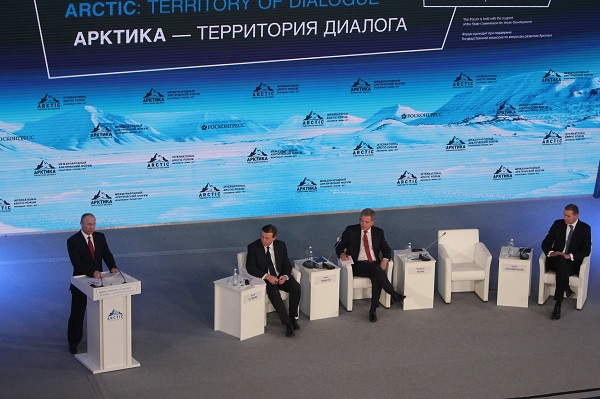Arctic becomes hot place for energy, transport cooperation
Published : 31 Mar 2017, 12:12
Arctic and non-Arctic countries have expressed their willingness to jointly develop the North Pole in a sustainable manner during a just concluded forum here.
More than 2,000 participants from nearly 30 countries, including senior government officials, organization leaders and experts, attended the fourth International Arctic Forum (IAF) held in Russia's far northwestern city of Arkhangelsk on Wednesday and Thursday.
They envisaged cooperation in a broad range of fields, mainly including energy production and transport connectivity.
Rustam Tankayev, a leading expert with the Russian Union of Oil and Gas Producers, noted that no country can manage Arctic development on its own as the challenges are too knowledge-, capital- and labor-intensive, saying: "The only way to achieve success is through collaboration."
ENERGY PRODUCTION
At the forum, Russian President Vladimir Putin said the importance of the Arctic has greatly increased.
"Preserving the Arctic as a territory of constructive dialogue, development and equal cooperation is a matter of fundamental importance," he said.
According to IAF data, the Arctic contains approximately 22 percent of the world's undiscovered hydrocarbon resources, of which 13 percent are oil, 30 percent natural gas and 20 percent gas condensate.
With one fifth of its territory located north of the Arctic Circle, Russia plans to ratchet up resources exploitation in the Polar region.
Currently, 17 percent of Russia's total oil production comes from the Arctic, but this share will increase to 26 percent in the coming 20 years, said Russian Energy Minister Alexander Novak.
However, Artur Chilingarov, Putin's special representative for international cooperation in the Arctic and Antarctic, said Russia has to look for new methods to extract oil and gas and build pipelines if a warming atmosphere makes the frozen earth line retreat to further north.
He added that as countries in and near the Arctic region and even southeast Asian countries have shown common interest in scientific research on the North Pole, Russia can establish partnerships with them.
When addressing the opening ceremony of the forum, Chinese Vice Premier Wang Yang said China will support the formation of advanced scientific research platforms to enhance Arctic scientific research capability, adding that his government encourages companies to step up clean energy cooperation with Arctic countries.
China, as an important stakeholder in Arctic affairs, is willing and able to play a bigger role in Arctic development and cooperation, Wang said.
SHIPPING ROUTE
The Northern Sea Route (NSR), linking Europe and Asia, runs along Russia's Arctic coast. Despite drawbacks such as the sea ice problem, this shipping line can save approximately 10 days of transport time compared with the conventional route via the Suez Canal.
"Changes in the ice situation and the availability of new up-to-date vessels make the NSR an almost year-round artery. At least, it will become one in the near future," said Putin.
He said Russia pays special attention to the NSR and invites foreign colleagues to make active use of the opportunities offered by the route.
In his address, Wang also said the Chinese government encourages enterprises to take part in the construction of the Arctic shipping route.
Meanwhile, Mikhail Remizov, president of the Russian Institute of National Strategy, said developing the NSR is still challenged by a lack of new icebreakers and maritime infrastructure, including island and coastal weather stations, oceanographic and satellite services, and search and rescue services.
As for human activities in the polar region, "one needs to be three times as careful" because the ecosystem there is very fragile, said Boris Porfiriev, deputy director of the Institute of Economic Forecasting at the Russian Academy of Sciences.
The length of time to be spent by a company in the Arctic should be prescribed by law, Porfiriev suggested.
U.S. Ambassador to Russia John Tefft called on maritime countries to ensure sustainability in the Arctic.
It is crucial that they come together to form a policy that allows all countries to benefit from Arctic resources, he said.


